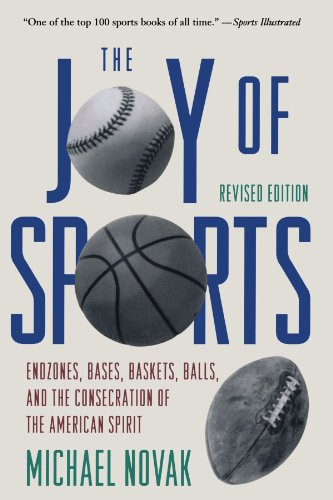The nature of sports
“Believers in sport do not go to sport to be entertained; to plays and dramas, maybe, but not to sports. Sports are far more serious than the dramatic arts, much closer to primal symbols, metaphors, and acts, much more ancient, much more frightening.”
What did sport philosopher Michael Novak mean by this statement in his 1967 tome “The Joy of Sports”?
Novak was responding to the growing commercialization of sports and their transformation from moral and spiritual activities to commodities meant for consumption. Every trend he identified 55 years ago has accelerated.
This passage expresses what was being lost amidst changes in technology and attitude that birthed today’s modern sporting culture based on spectacle and entertainment. What we lost was sport’s nature.
Novak’s passage also gives us clues on how to fight back against the degradation of sport.
There’s 3 important lessons we can learn.
1.Sports aren’t meant for entertainment
When you improperly understand the nature of any activity you will not act in a way that reveals it’s true value.
Modern society views sports as entertainment. We pay lip service to the idea of sport as a place for moral development in youth sports, but even that isn’t safe anymore.
Kids as young as 8-9 play the same sport 12 months a year, hire a team of coaches, and neglect developing other social and development skills because their parents KNOW they’re the next big star!
Think of sport as entertainment gives us professional athletes who care only about money, fans who’d rather bet and play fantasy sports than run a mile on their own, and owners who threaten community pride with balance sheets and moving teams to ‘greener’ pastures.
Novak expertly highlights the way a sports fan whose identity is deeply tied with their team does not watch sports to be ‘entertained.’
They feel a range of emotions and enact a symbolic representation of the deepest elements of our humanity.
2.Sports are a deep form of culture
That leads to the second important lesson. Sports aren’t like other cultural forms.
They are deeper and more meaningful because of their religious nature.
Because they aren’t meant for entertainment when we play and watch sports we experience something powerful.
If we participate we learn that struggle is positive, losing is learning, discipline is strength, and determination leads to achievement.
If we watch then we feel these lessons as we struggle along with the athletes.
When someones says’ ‘it’s just a game’ they’re wrong. It’s more than just a game. It’s an expression of the depth of human experience.
3.We shouldn’t consume sports, we should experience them
The final lesson is that to grab the full value of sports we must EXPERIENCE them. That means you must PLAY them at some level.
When watching get into the struggle and FEEL all the emotions. I
f we keep them at the surface and just consume them we can’t access the deep and frightening nature. We lost the ability to learn from the ancient wisdom.
Realigning sports in our own lives
If we want to reclaim sports as moral arenas meant for character development and symbolic representation of the deepest elements of humanity we must resist the urge to fall into the ‘entertainment’ trap. Here’s some quick advice on how you can start doing that today.
Play more sports than you watch
This provides good balance between doing and watching. The more you do the more you will appreciate the sports you watch. The athletes aren’t as distant because you are consistently struggling with your own body. You can relate.
Watch sports with intention and not for distraction
When you do watch sports make sure it is meaningful. It’s a team you follow passionately. It’s a rare moment and you want to witness history. It’s a way to bond with family and community. Watch for deeper purpose and you’ll find deeper meaning in the game.
Support local sports
The big time professional game is too far removed from most of us. If you have local teams whether it be schools or semi-professional support them. Become active in the community and use these teams to engender community pride and identity. If you’re local team IS a big time pro team that’s fine, but most of us have teams in our cities and towns that could use more local support.
Celebrate the professionals who ‘get it’
A lot of pro athletes today are prima donnas who care about flash and money. There are some athletes who still show us the true value of sport through their example. NBA star Giannis Antetokounmpo recently schooled sport journalist on winning and losing and what it means for success and failure. Athletes who model these values should be praised and promoted.
A final historical lesson
There is too much good in the world of sport to allow it to slide in irreverance due to it’s immorality. If you think I’m being overly dramatic I’ll leave you with one final thought.
The Ancient Greeks gave the world competitive athletics for their own sake. They sprang from religion and each athletic festival was a religious observance. Even in THIS society sports tilted towards spectacle, commodity, and entertainment. Eventually the Greek world became soft and they were conquered by a foreign power, the Roman Republic. The Romans took the idea of sport and turned them into the largest state sponsored spectacles the world has ever seen. What else happened during this time? The Roman Republic became the Roman Empire and all the citizens lost their rights. But you know what they DID have? Sporting entertainment.
Next time you crack open your phone to check your fantasy team or yell at a professional athlete when you can’t bend over to touch your toes think about where too much entertainment in an activity meant for something deeper leads us as individuals and society.
I wish you good sport playing and watching!




